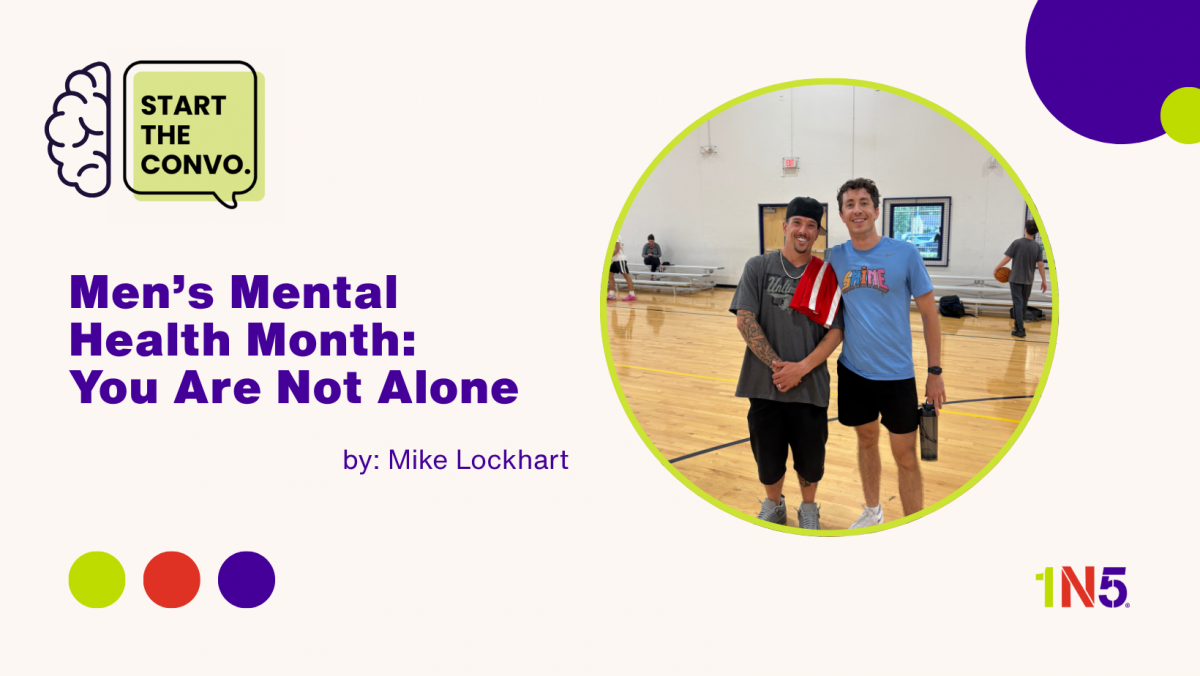At the start of June, many people celebrate the arrival of summer — the warm weather, school breaks, and all the joy the season brings. In recent years, though, Men’s Mental Health Month has gained the much-needed attention it deserves during this time, helping to raise awareness about the unique mental health challenges that men face.
Each year, this month reminds me how much support I’ve found on my own mental health journey, and it serves as a milestone for growth and reflection, year after year. As June comes to a close, it’s important to remember that awareness of men’s mental health shouldn’t end with the month.
My Story
Hi, I’m Mike—currently a member of 1N5’s Emerging Leaders Board and an advocate for men’s mental health.
My mental health journey began in the fall of 2018. I was a junior at Miami University. On the surface, everything was going well — I had stellar grades, a supportive family, and an active social life. I was known as the “happy-go-lucky” guy who always had a smile on his face.
But after the end of a long relationship and other personal changes, I started experiencing intense anxiety. I began questioning who I was, wondering if I was “good enough” as a friend, a son, a student. I became my own harshest critic. On the outside, everything still looked perfect, but inside, I was spiraling.
By the spring of 2019, I began having panic attacks. I’d overthink, self-criticize, and send myself into episodes where I couldn’t control my breathing or my racing thoughts. As a 20-year-old man, I knew something was wrong, but I had no idea what to do. I’d never heard any male friends or family openly talk about feelings like this. I felt like I was living on an island, alone. Worse, I feared that if I did open up, I would be judged for being honest about my emotions and my struggle with self-confidence. I saw too many men brushing aside sadness, anger, or anxiety in unhealthy ways, so I followed that same path, internalizing my feelings and turning to unhealthy coping mechanisms in the hope the pain would just go away.
One night, my housemate, a close friend, found me curled in the fetal position on the bathroom floor in the middle of a panic attack. He sat with me and reassured me that I wasn’t alone. That was the first moment I truly realized that opening up was not weakness, and that I had an ally.
College During a Pandemic
Fast forward to my senior year — what was supposed to be the best time of my life ended up feeling like a daily rollercoaster. Some mornings I’d wake up feeling great, while others I felt like a complete mess. Though I now had someone I trusted, I still struggled to be fully honest about my feelings. I kept telling my friend, “I’m okay,” even when I wasn’t.
Then COVID-19 hit in March 2020, and my life changed overnight. Many of the experiences I’d been looking forward to were ripped away. I worried I’d never see some friends again. I struggled with isolation, unable to engage in the social interactions I loved most.
I returned to Miami to pursue my master’s in education and graduated with a 4.0 GPA. But despite this success, I felt increasingly sad and disconnected. The smile I wore into 2021 was a facade. I was using unhealthy habits to try to numb my anxiety and sadness, and digging myself into a deeper and deeper hole.
The Turning Point
In December 2021, I hit rock bottom. My anxiety and depression became unbearable. One night, after a severe panic attack, I turned to self-harm in a desperate attempt to escape what I was feeling.
It was in that moment, after doing the unthinkable, that I knew I needed help.
I called the one person I knew would love and support me no matter what: my sister, Cassie. Through an hour-long phone call, I poured out everything I had been holding in for years. Cassie helped me find treatment. That night, I was admitted to the Lindner Center of HOPE’s Partial Hospitalization Program (PHP).
My seven days at the Lindner Center were life-changing. For the first time, I felt stabilized and empowered to manage my mental health. I built a support network and committed to ongoing care through therapy and monthly check-ins with my psychiatrist. I haven’t looked back since.
Where I Am Today
Now, nearly four years later, I’ve learned so many valuable ways to manage my anxiety and depression, and most importantly, I’ve built a support network where I can share my feelings openly, whether good or bad.
Some of the practices that help me the most:
- Exercise: I love lifting weights and playing basketball in men’s leagues and pickup games. These activities clear my mind and keep me grounded in the present.
- Journaling: I journal once a week about how I’m feeling. Before bed, I often read previous entries to spot patterns — what makes me feel good, and what triggers bad days.
- Healthy hobbies: I’ve enjoyed exploring new activities like rock climbing, tennis, pickleball, running, hiking, and even trading sports cards. These hobbies give me positive outlets and joy.
Final Thoughts
Looking back on my journey, here’s what I know for sure: No one should suffer in silence.
To any man reading this: You do not have to fight mental illness alone. Please, talk to someone you trust, whether it’s a friend, a family member, or a professional. Over the past seven years, I’ve seen incredible progress in breaking the stigma around men seeking help. It’s no longer a sign of weakness — it’s a sign of strength.
Today, I know without a doubt: I am not alone, and I never will be again.

